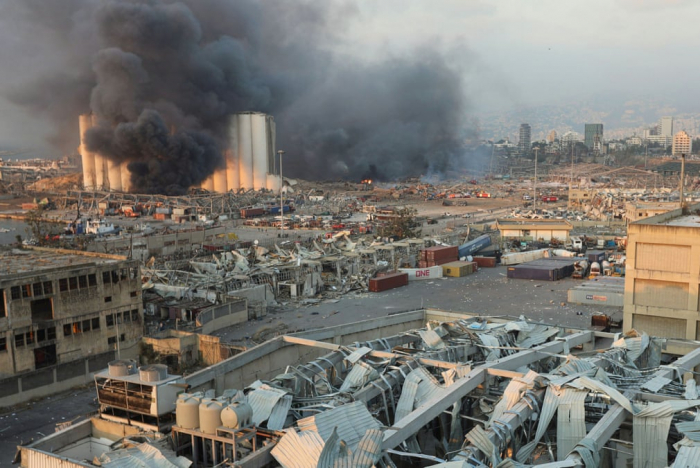Early last August, residents near the Lebanese port of Beirut watched in horror as one of the largest non-nuclear, human-caused explosions on record tore a chunk out of their city, leaving hundreds dead, thousands injured, and hundreds of thousands homeless.
Its shock was felt around the globe - sensors as far away as Tunisia and Germany picked up the deep rumble, and seismic stations around 500 kilometers (just over 300 miles) away recorded its tremor.
Now it turns out the Beirut explosion caused the highest layers of the atmosphere to shake, and the resulting data could inform future efforts to keep an eye on weapons testing conducted by rogue states.
Researchers from India's National Institute of Technology, Rourkela, and Hokkaido University in Japan measured electrical disturbances in the ionosphere, finding the blast was comparable to the impact of many volcanic eruptions.
"We found that the blast generated a wave that traveled in the ionosphere in a southwards direction at a velocity of around 0.8 kilometers per second," says Kosuke Heki, an Earth and planetary scientist from Hokkaido University.
Commencing around 50 kilometers (about 30 miles) overhead, and stretching into space hundreds of kilometers away, the ionosphere is characterized by high numbers of free-roaming electrons that get booted from gas molecules by solar radiation.
The team used variations in phases within microwave transmissions sent by the Global Navigation Satellite System (GNSS) on the day of the explosion to calculate changes in the distributions of the electrons, which in turn indicated the presence of acoustic waves through the gases.
It's a trick that scientists have used since the advent of such satellite networks in the 1990s, measuring ripples sweeping through the upper reaches of our atmosphere to note subtle signatures of anything from volcanoes to rogue nuclear testing.
One of the first experimental forays into using global positioning satellite (GPS) technology to measure surface explosions took place in the mid-1990s, with scientists taking advantage of three massive underground blasts at a coal mine in Wyoming, USA to study how the ionosphere responded.
Yet finding the faint traces of the Beirut explosion in this instance wasn't without a small amount of luck. With the event occurring early in the evening and close to sundown, ionosphere irregularities called equatorial plasma bubbles might have masked the signal altogether.
Fortunately, there were no signs of these bubbles at the time, giving the scientists a relatively clear image of the blast's wash slipping through the upper atmosphere at the speed of sound.
The researchers compared the impact of the Beirut explosion on the ionosphere with similar scars left by a number of recent volcanic eruptions in Japan, finding it more or less comparable. In the case of the eruption of Asama Volcano in central Japan in 2004, the Beirut blast was far more impactful.
Though slightly weaker than the 1.5 kiloton blasts studied all those decades ago in the Wyoming mine, the fact this explosion was exposed on Earth's surface gave it an unimpeded path towards the sky, with a release of energy clearly evident in the data.
Building a database of acoustic signatures that can be detected by the GNSS is providing scientists and authorities with a means to monitor not just the geological dynamics of our world, but its political friction as well.
We now know it took 2,700 tons of ammonium nitrate – a fertilizer also commonly used as an ingredient for explosives – to generate what's calculated to be equivalent to the detonation of 1.1 kilotons of TNT, putting it in the ballpark of a low-yield nuclear bomb.
The ability for states like Iran and North Korea to progress towards nuclear armament is still a concern for long-term global peace, so having a number of clever ways to keep an ear out for testing programs wouldn't go astray.
To the citizens of Beirut, the devastation of the 2020 port explosion is just one more insult piled on top of economic distress and the scourge of the coronavirus pandemic. It's not an event anybody would care to see repeated elsewhere; learning all we can about its impact can ensure it won't be.
This research was published in Scientific Reports.
More about: #Beirut
















































